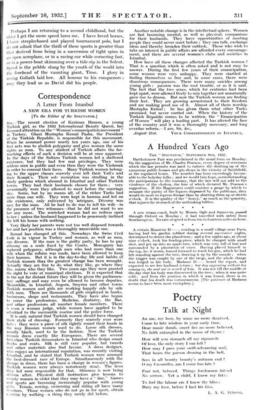Correspondence
A Letter From Istanbul
ANEW ERA FOR TURKISH WOMEN [To the Editor of the SPECTATOR.] sm,—The recent election of Kerinaan Hanem, a young Turkish girl, as the 1932 International Beauty Queen, has focussed attention on the "Women's emancipation movement "• in Turkey. Ghazi Mustapha Kemal Pasha, the President of the Turkish Republic, is responsible for this movement. When he assumed power nearly ten years ago, one of his first acts was to abolish polygamy and give women the same rights as men. To any student of Turkish affairs the far- reaching effects of such a decision will be at once apparent. In the days of the Sultans Turkish women led a sheltered existence, but they had few real privileges. They were seldom seen in-public and even then they wore the Yashmak in order to conceal their faces. Many Turkish women belong- ing to the upper classes scarcely ever .left their Yali's and their Konak's. Their 'sole -recreation was strolling in the shady gardens which abound in Istanbul and other Turkish towns. They had their husbands chosen for them ; very occasionally were they allowed to meet before the marriage day. Some, but by no means all, of the richer Turks had more than one wife. They were kept in harems and led an idle existence, only enlivened by intrigues. Divorce was easy for the man. All he had to do was to tell his wife—in the presence of two witnesses—that he did not want to see her any more. The wretched woman had no redress open to her ; unless the husband happened to be generously inclined she left his house with nothing.
Very likely her parents were not too well disposed towards her and her position was a thoroughly unenviable one.
Kemal has changed all this.. Nowadays the Swiss Civil Code is in vigour in Turkey and women, as well as men, can divorce. If the man is the guilty party, he has to pay alimony on a scale fixed by the Courts. Monogamy has replaced polygamy, although men who had more than one wife when the reforth was made, have been allowed to keep their harems. But it is in the day-to-day life and habits of Turkish women thal the greatest change -has been wrought. Actually they are free to do what they like, go where they like, marry who they like. Two years ago they were granted the right to vote at municipal elections. It is expected that in the not far distant future they will be given the parliamen- tary suffrage and may even be allowed to become deputies. Meanwhile, in Istanbul, Angora, Smyrna and other towns Turkish women and girls are working happily side by side with men. There are thousands of girls employed in banks, businesses, shops and restaurants. They have also begun to enter the professions. Medicine, dentistry, the Bar, and other professions all number female members. There is even a woman judge, while women have applied to be admitted to the mercantile marine and the police force.
It is only natural that Turkish women should have changed their style of dressing. Formerly they scarcely ever wore hats ; they wove a piece of silk tightly round their heads in the way Russian women used to do. Loose silk dresses, usually black, used to be the fashion. Now the Turkish women dress exactly like Europeans. There are several tirst-class- Turkish dressmakers in Istanbul who design smart frocks and • coats. Silk is still very popular, but tweeds and other materials also find favour. A dress designer, Who enjoys an international reputation, was recently visiting Istanbul, and he stated that Turkish women were amongst the best-dressed race of Europe. Simultaneously with the Change in dress, there has been a change in women's figures. Turkish women were always notoriously stout. The lives they led were responsible for that. Slimness is now being striven after. Physical drill instructors give lessons to society women in order that they may have a line." Games and sports are becoming increasingly popular with young girls. Tennis-, rowing, swimming and riding all have many devotees. Those women who do not go in for sport, obtain erxrcise by walking—a thing they rarely did, before.
Another notable change is in the intellectual sphere. Women are .fast becoming mental, as well as physical, companions for their husbands. They have opportunities of meeting . people they could never meet before • they can talk, exchange ideas and thereby broaden their outlook. Those who wish to take an interest in public affairs are afforded every encourage- ment, and there are several women's clubs and societies in Istanbul.
How have all these changes affected the Turkish women ? That is a question which is often asked and is not easy to answer. During the first few years of their emancipation, some women were very unhappy. They were startled at finding themselves so free and, in some cases, there were disastrous consequences. There were many suicides among young girls; • passion was the root trouble, or so it is said. The fact that the two sexes, which for centuries had been kept apart, were allowed freely to mix together not unnaturally gave rise to drama. But now the Turkish women are finding. their feet. They are growing accustomed to their freedom and are making good use of it. Almost all of them worship Must,apha Kemal ; he has given them what other Turks promised, but never carried out. When the history of the Turkish Republic comes to be written, the "Emancipation of Women will play a leading part. It has altered the face of the country and it was a thoroughly necessary, and long overdue reform.—I am, Sir, &c., August 21st. YOUR CORRESPONDENT IN ISTANBUL.






























 Previous page
Previous page